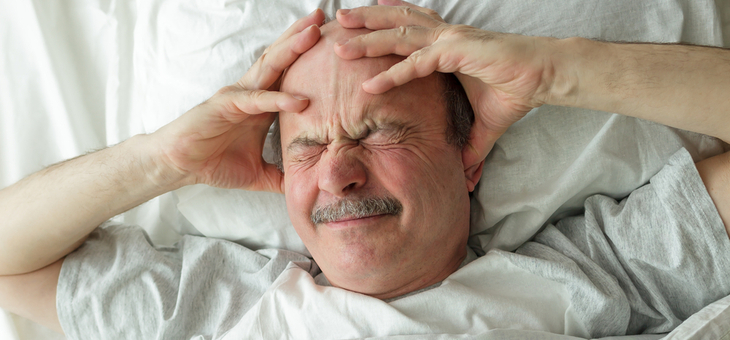In a stark warning about the potential health of older Australians, only eight per cent of YourLifeChoices respondents to the Friday Flash Poll, What Keeps You Awake at Night, say they wake up feeling fresh.
Of the 550 respondents – 87 per cent of them aged between 60 and 80 – most (44 per cent) woke in a neutral mood, 15 per cent woke “feeling poorly”, five per cent in a poor mood and 25 per cent in a good mood. The World Sleep Day-inspired poll delivered a wake-up call.
We reported last November that the Government is sufficiently concerned about our sleep habits that it established a sleep inquiry and appointed Liberal MP Trent Zimmerman as chairman of the Sleep Health Awareness in Australia committee. The results of that inquiry are yet to be tabled. However, research links poor sleep to a range of physical and mental health issues, including heart attacks, Alzheimer’s and depression.
Sixty per cent of our poll respondents say they don’t sleep well or only sometimes sleep well, while just over one-third (37 per cent) believe they get quality sleep.
So what are the culprits?
Asked what keeps you awake at night, the main issue was physical health problems (21 per cent), followed by family concerns (20 per cent), money worries (13 per cent), noise (eight per cent), mental health issues and relationship issues (six per cent each), bad bed/pillows and environment (five per cent each) and medications (three per cent).
In YourLifeChoices 2019 Ensuring Financial Security in Retirement Survey, respondents said health issues were the main reason for retiring (30 per cent of 3397 respondents). And 38 per cent were either concerned or very concerned about whether they could maintain their current lifestyle in retirement. It makes sense older Australians are losing sleep. But back to the Friday Flash Poll.
When asked what action they take to help them sleep better, 21 per cent said they try to get more comfortable, while other popular responses were exercise (15 per cent), special drinks such as chai, hot chocolate and warm milk (12 per cent), medication but not sleeping pills (11 per cent), sleeping pills (eight per cent), food (five per cent), sex (three per cent) and meditation (one per cent).
Most respondents (40 per cent) get five to six hours sleep per night, 33 per cent get seven to eight hours, 19 per cent four to five hours, five per cent eight to nine hours and only one per cent get less than three hours or more than 10.
So how much sleep do we need?
Dr Katharina Lederle, a sleep and fatigue specialist with a Masters in biosciences and a PhD in the human body clock, says our sleep needs vary from person to person and that it’s important not to beat yourself up for what you may think is too little sleep compared to others.
“Many people believe they need eight hours simply because that is what they read and hear about,” she says. “While this amount might be in the right ballpark for the majority of people, it doesn’t apply to every one of us.
“In fact, the range is quite large when it comes to how long people need to sleep to feel refreshed in the morning. About 60 per cent of the adult population need approximately seven to nine hours, and any duration between six and 10 hours can be appropriate.
“Apart from age, gender can determine how much sleep people need, with women needing a bit more sleep than men.”
Dr Lederle says changes in our sleep needs become most noticeable from our 40s onwards. Reductions in REM (Rapid Eye Movement) sleep start to occur after the age of 50.
“Our sleep pattern also changes, and as we grow older, sleep timings shift back and forth. What it comes down to is how you feel during the day – do you feel refreshed and in a good mood most days, or do you lack energy and feel low? If so, see your GP or sleep specialist. It might also help to review your current lifestyle and the nature of your job, as both can affect your sleep (think of them as superimposing over your biological factors).”
Speaking from experience, YourLifeChoices members had some handy tips.
“Turn off ALL screens, including the TV, darken the room (use blockout curtains if like me you sleep during the day), make sure the window is open to allow fresh air to enter, and relax!” says Jezemeg8.
Musicveg says: “Having a healthy diet will help you sleep. If you consume alcohol, a lot of sugar and fat, your body has a hard time during the night when the liver is detoxing. All healing takes place when you sleep, so the less healthy you are, the more likely your sleep will be disturbed. Look after your liver and you will feel more relaxed. Taking magnesium also helps as well as putting magnesium oil on your aches and pains before bed.”
Troubadour says: “IF, and it is not often, I have trouble sleeping, I get up, make a cup of hot milk and honey, sit for a little while and then go back to bed and find I can get back off to sleep no worries. I also spray my pillow with a lavender spray, Lavender does really help.”
Shall we call it a night?
Do you put up with poor sleep believing it is just a part of growing old? Does poor sleep run in the family?
Related articles:
Could cannabis solve sleep woes?
How to recover from a bad night’s sleep
Gizmos to help you sleep

